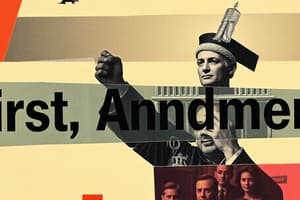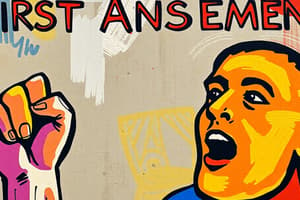Podcast
Questions and Answers
What does the Tinker Test establish regarding students' free speech rights?
What does the Tinker Test establish regarding students' free speech rights?
- Students have no rights to free speech in schools.
- Schools can censor any student speech they deem inappropriate.
- Students can express any opinion without consequences.
- Students have the right to free speech except when it disrupts school operations. (correct)
Which Supreme Court case ruled that lewd or offensive speech can be punished in schools?
Which Supreme Court case ruled that lewd or offensive speech can be punished in schools?
- Morse v. Frederick
- Hazelwood School District v. Kuhlmeier
- Tinker v. Des Moines Independent Community School District
- Bethel School District v. Fraser (correct)
Which of the following is NOT an exception to the Tinker ruling?
Which of the following is NOT an exception to the Tinker ruling?
- Schools can control the content of school-sponsored speech.
- Schools can prevent speech that supports illegal activities.
- Schools can limit offensive speech even if it does not disrupt activities.
- Schools can punish students for off-campus speech that causes disruption. (correct)
What does the term 'substantial disruption' refer to in the context of student speech?
What does the term 'substantial disruption' refer to in the context of student speech?
In which case did the Supreme Court rule that schools could control content of school-sponsored materials?
In which case did the Supreme Court rule that schools could control content of school-sponsored materials?
To what extent does the First Amendment protect freedom of speech in public schools?
To what extent does the First Amendment protect freedom of speech in public schools?
What principle did the court emphasize regarding student expression?
What principle did the court emphasize regarding student expression?
Flashcards are hidden until you start studying
Study Notes
Freedom of Speech in Public Schools
- First Amendment to the Constitution protects freedom of speech from government intrusion, but it does not apply to individuals or other organizations.
- Public schools are technically part of the government because they are funded by taxpayers and run by state and local school boards.
- The Supreme Court ruled in Tinker v. Des Moines Independent Community School District (1969) that students do have the right to free speech, even in schools.
- Tinker Test states that students have free speech rights in school, except when they substantially disrupt school operations or infringe upon the rights of others.
- Substantial disruption is defined as something that meaningfully interferes with the school’s ability to teach.
- Three major exceptions to Tinker in subsequent Supreme Court rulings:
- Bethel School District v. Fraser (1986): Schools can punish speech that is lewd or offensive, even if it does not disrupt school activities.
- Hazelwood School District v. Kuhlmeier (1988): Schools can control the content of school-sponsored speech, such as school newspapers.
- Morse v. Frederick (2007): Schools can punish speech that promotes illegal drug use, even if it occurs off-campus.
- Brandi Levy case (Mahanoy Area School District v. B.L., 2021): Involved a student’s off-campus Snapchat post critical of her school’s cheerleading squad. The Supreme Court ruled that the school could not punish her for her off-campus speech because it did not cause substantial disruption within the school.
Students' Free Speech Rights in the Digital Age
- Social media complicates the Tinker Test because it blurs the line between on-campus and off-campus speech.
- The Levy case suggests that schools may have less power to control student speech that occurs off-campus.
- The Court's ruling in Levy recognizes the changing nature of student communication in the digital age.
- The implications of the Levy case for student free speech rights are far-reaching.
Brandi Levy Case
- Brandi Levy, a high school student, posted a Snapchat photo criticizing her cheerleading squad.
- The school suspended her for her off-campus post, citing the school's social media policy.
- The ACLU represented Levy and argued that the school's actions violated her First Amendment rights.
- The Supreme Court ruled 8-1 in favor of Levy, stating that her off-campus speech was protected by the First Amendment.
- The court recognized that schools need to maintain safe learning environments, but couldn't create a broad rule for punishing off-campus speech.
- The court's ruling was influenced by the Tinker decision, recognizing schools as "nurseries of democracy."
- The court emphasized that the First Amendment protects students' right to express their views, even when those views are unpopular or controversial.
Importance of Free Speech
- The Brandi Levy case highlights the importance of individual freedom of expression and the right to dissent.
- The court's decision emphasizes the importance of students having the freedom to express themselves, even if their opinions are unpopular.
- The court stated that schools are responsible for fostering an environment that allows students to develop their critical thinking skills and understand diverse perspectives.
Implications for Schools
- The case raises challenges for schools in managing student behavior online and offline.
- Schools must balance the need to maintain a safe learning environment with the need for students to express their opinions freely.
- Schools need to develop clear policies regarding off-campus speech that comply with First Amendment rights.
- The case encourages schools to foster a culture of respect and understanding, allowing students to express themselves freely and responsibly.
Students' Free Speech
- The First Amendment protects freedom of speech from government intrusion, but it doesn't apply to individuals or other organizations.
- Public schools are considered part of the government due to taxpayer funding and management by state and local boards.
- The Supreme Court established student's free speech rights in schools in Tinker v. Des Moines Independent Community School District (1969).
- The Tinker Test states that students have free speech rights, except when it disrupts school operations or infringes on others’ rights.
- Bethel School District v. Fraser (1986) ruled schools can punish speech deemed lewd or offensive, even if it doesn’t disrupt school activities.
- Hazelwood School District v. Kuhlmeier (1988) ruled schools can control content of school-sponsored speech, like school newspapers.
- Morse v. Frederick (2007) ruled schools can punish speech promoting illegal drug use, on or off campus.
- Mahanoy Area School District v. B.L. (2021) involved a student's off-campus Snapchat post criticizing her cheerleading squad. The Supreme Court ruled that the school couldn’t punish her for it because it didn’t cause substantial disruption.
Brandi Levy Case
- A student posted a Snapchat photo criticizing her cheerleading squad, leading to suspension.
- The Supreme Court ruled 8-1 in favor of the student, recognizing her off-campus speech as protected by the First Amendment.
- The court emphasized the importance of schools maintaining safe learning environments, but could not establish a broad rule punishing off-campus speech.
- The court's ruling was shaped by Tinker, acknowledging schools as "nurseries of democracy" and that student expression is vital for critical thinking and understanding diverse perspectives.
Implications of the Levy Case
- The court's ruling in Levy case signifies the shifting landscape of student communication in the digital age.
- The Levy case poses challenges for schools in managing student behavior online and offline.
- Schools must balance maintaining safe learning environments with respecting students’ right to free expression.
- The case encourages schools to foster a culture of respect and understanding, allowing students to express themselves freely and responsibly.
Importance of Free Speech
- The case underscores the significance of individual freedom of expression and the right to dissent.
- The court highlights the importance of students having the freedom to express their views, even if those views are unpopular or controversial.
Studying That Suits You
Use AI to generate personalized quizzes and flashcards to suit your learning preferences.




